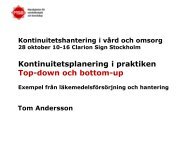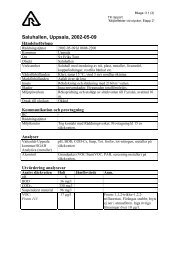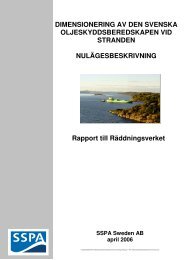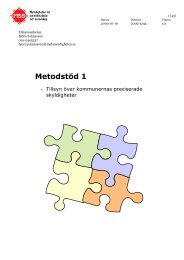- Page 1 and 2:
FÖRFÄRAS EJ 50 år med det psykol
- Page 3 and 4:
FÖRFÄRAS EJ Boken FÖRFÄRAS EJ
- Page 5 and 6:
4 FÖRFÄRAS EJ Att skydda själen,
- Page 7 and 8:
Styrelsen för psykologiskt försva
- Page 9 and 10:
8 FÖRFÄRAS EJ Generaldirektörens
- Page 11 and 12:
10 FÖRFÄRAS EJ Temat om förändr
- Page 13 and 14:
Den Mossbergska utredningen var ova
- Page 15 and 16:
14 FÖRFÄRAS EJ SIS. Folkberedskap
- Page 17 and 18:
Inrikesminister Eije Mossberg skrev
- Page 19 and 20:
Mot slutet av 80-talet fick SPF ett
- Page 21 and 22:
Professor Torsten Husén var styrel
- Page 23 and 24:
Ljudteknikern i rök och damm i civ
- Page 25 and 26:
Chefredaktör Sven O Andersson var
- Page 27 and 28:
Redaktören och författaren Yrsa S
- Page 29 and 30:
Sedan Överklagandenämnden för to
- Page 31 and 32:
Första sammanträdet med den nya s
- Page 33 and 34:
Gunnar Fredriksson som Aftonbladets
- Page 35 and 36:
34 FÖRFÄRAS EJ gan var ju från b
- Page 37 and 38:
Stig Fredriksson Foto: Eino Tubin 3
- Page 39 and 40:
38 FÖRFÄRAS EJ I konflikter blir
- Page 41 and 42:
40 FÖRFÄRAS EJ lysning och inform
- Page 43 and 44:
42 FÖRFÄRAS EJ Vi kopplade på PF
- Page 45 and 46:
44 FÖRFÄRAS EJ Jag tycker från m
- Page 47 and 48:
46 FÖRFÄRAS EJ Ett problem som v
- Page 49 and 50:
Ditt tal kan döda dina kamrater. E
- Page 51 and 52:
50 FÖRFÄRAS EJ Ord, ljud och bild
- Page 53 and 54:
Typisk brittisk affisch med s.k. Gr
- Page 55 and 56:
De allierade lade ner mycket möda
- Page 57 and 58:
Propagandaaffischen har haft en vik
- Page 59 and 60:
58 FÖRFÄRAS EJ vågsstationer had
- Page 61 and 62:
60 FÖRFÄRAS EJ militära ledare m
- Page 63 and 64:
62 FÖRFÄRAS EJ Organisationen fic
- Page 65 and 66:
Ett klassiskt exempel på desinform
- Page 67 and 68:
66 FÖRFÄRAS EJ av argentinska vap
- Page 69 and 70:
Den 21 april 1999 träffades det 18
- Page 71 and 72:
70 FÖRFÄRAS EJ general Tommy Fran
- Page 73 and 74:
Flygblad från det andra Irak-krige
- Page 75 and 76:
Försvarsmakten analyserar för nä
- Page 77 and 78:
Major Anders Franchell var en av pi
- Page 79 and 80:
78 FÖRFÄRAS EJ komponenter som
- Page 81 and 82:
Ibland tangerar propagandabilderna
- Page 83 and 84:
82 FÖRFÄRAS EJ Övningen var för
- Page 85 and 86:
84 FÖRFÄRAS EJ Kris i långbänk
- Page 87 and 88:
86 FÖRFÄRAS EJ Några år tidigar
- Page 89 and 90:
Radiobevakningsövning i Vallby 198
- Page 91 and 92:
På psykförsvarets ledningsövning
- Page 93 and 94:
92 FÖRFÄRAS EJ En enkel och en sa
- Page 95 and 96:
Kjell Aggefors Foto: Eino Tubin 94
- Page 97 and 98:
96 FÖRFÄRAS EJ med nyckelpersoner
- Page 99 and 100:
98 FÖRFÄRAS EJ Radio Tirana syssl
- Page 101 and 102:
100 FÖRFÄRAS EJ Kapitel 4. Forskn
- Page 103 and 104:
102 FÖRFÄRAS EJ projekt som t.ex.
- Page 105 and 106:
Tidigt under krigen i f.d. Jugoslav
- Page 107 and 108:
106 FÖRFÄRAS EJ politiska anknytn
- Page 109 and 110:
Möjligheterna att manipulera nyhet
- Page 111 and 112:
En av Beredskapsnämndens mest uppm
- Page 113 and 114:
112 FÖRFÄRAS EJ Självfallet inne
- Page 115 and 116:
Information i samband med miljöska
- Page 117 and 118:
116 FÖRFÄRAS EJ materialet att de
- Page 119 and 120:
118 FÖRFÄRAS EJ der, som uppkom n
- Page 121 and 122:
120 FÖRFÄRAS EJ ska folket tillg
- Page 123 and 124:
Rutger Lindahl Foto: Anders Qwarnst
- Page 125 and 126:
124 FÖRFÄRAS EJ Behövs det ett p
- Page 127 and 128:
SPF har en förmodligen världsunik
- Page 129 and 130:
128 FÖRFÄRAS EJ alla tillfrågade
- Page 131 and 132:
130 FÖRFÄRAS EJ försvarspositiva
- Page 133 and 134:
SPF:s opinionsundersökningar har a
- Page 135 and 136:
134 FÖRFÄRAS EJ ning till försva
- Page 137 and 138:
136 FÖRFÄRAS EJ har ju lyckats. V
- Page 139 and 140:
138 FÖRFÄRAS EJ ja, det är en br
- Page 141 and 142:
140 FÖRFÄRAS EJ Tjernobyl var kan
- Page 143 and 144:
142 FÖRFÄRAS EJ Kapitel 5. Inform
- Page 145 and 146:
Den brinnande norska färjan Scandi
- Page 147 and 148:
146 FÖRFÄRAS EJ fick allt fastare
- Page 149 and 150:
148 FÖRFÄRAS EJ tens fallstudier
- Page 151 and 152:
150 FÖRFÄRAS EJ Enköping våren
- Page 153 and 154:
152 FÖRFÄRAS EJ fanns speciella s
- Page 155 and 156:
154 FÖRFÄRAS EJ En särskild utre
- Page 157 and 158:
156 FÖRFÄRAS EJ metoder och yrken
- Page 159 and 160:
Göran Boberg Foto: Eino Tubin 158
- Page 161 and 162:
160 FÖRFÄRAS EJ ken. Souschefen A
- Page 163 and 164:
Birgitta Darrell 162 FÖRFÄRAS EJ
- Page 165 and 166:
Flera år före mjältbrandsattacke
- Page 167 and 168:
Malin Modh Foto: Eino Tubin 166 FÖ
- Page 169 and 170:
168 FÖRFÄRAS EJ Hur kom du in på
- Page 171 and 172:
170 FÖRFÄRAS EJ Bistånd till Bal
- Page 173 and 174:
172 FÖRFÄRAS EJ ett land som haft
- Page 175 and 176:
174 FÖRFÄRAS EJ Vår motpart Cent
- Page 177 and 178:
176 FÖRFÄRAS EJ förankring. Proj
- Page 179 and 180:
178 FÖRFÄRAS EJ Kapitel 6. Försv
- Page 181 and 182:
180 FÖRFÄRAS EJ Jordbruksnämnden
- Page 183 and 184:
Kanslichefen vid riksdagens försva
- Page 185 and 186:
I den sista utgåvan av ”17”, s
- Page 187 and 188:
186 FÖRFÄRAS EJ och behövde en f
- Page 189 and 190:
SPF fick 2000 priset “Guldklappan
- Page 191 and 192:
Eva Regnér Foto: Eino Tubin 190 F
- Page 193 and 194:
192 FÖRFÄRAS EJ Det är nog för
- Page 195 and 196:
Göran Lindmark Foto: Eino Tubin 19
- Page 197 and 198:
196 FÖRFÄRAS EJ berörde delvis s
- Page 199 and 200:
Medan de svenska myndigheterna tän
- Page 201 and 202:
200 FÖRFÄRAS EJ Kanske hade man p
- Page 203 and 204:
202 FÖRFÄRAS EJ myndigheten borde
- Page 205 and 206:
204 FÖRFÄRAS EJ och Rabe var ute
- Page 207 and 208:
SPF:s referensgrupp i arbetet med E
- Page 209 and 210:
208 FÖRFÄRAS EJ Det största prob
- Page 211 and 212:
210 FÖRFÄRAS EJ tans till sitt ar
- Page 213 and 214:
De tre klassiska “Om kriget komme
- Page 215 and 216:
Ett uppslag ur 1961 års upplaga av
- Page 217 and 218:
216 FÖRFÄRAS EJ pa mobiliseringen
- Page 219 and 220:
Ett energiskt hemskyddsombud med tr
- Page 221 and 222:
220 FÖRFÄRAS EJ Alternativ eller
- Page 223 and 224: Erfarenheterna från Motståndsdele
- Page 225 and 226: Staffan Stenström Foto: Eino Tubin
- Page 227 and 228: 226 FÖRFÄRAS EJ Sammanslagning me
- Page 229 and 230: Bo Andersson är vice ordförande i
- Page 231 and 232: 230 FÖRFÄRAS EJ semöte den 3 jan
- Page 233 and 234: Lärarmöte på FBU-kursen i krisko
- Page 235 and 236: FBU-kursen i kriskommunikation somm
- Page 237 and 238: Sam Nilsson Foto:: Eino Tubin 236 F
- Page 239 and 240: 238 FÖRFÄRAS EJ på forskningssid
- Page 241 and 242: Mats Ekdahl Foto: Anders Qwarnströ
- Page 243 and 244: Försvarsminister Leni Björklund b
- Page 245 and 246: 244 FÖRFÄRAS EJ moderna medietekn
- Page 247 and 248: I Danmark kan skolklasser beställa
- Page 249 and 250: 248 FÖRFÄRAS EJ Bilaga 1. Källor
- Page 251 and 252: 250 FÖRFÄRAS EJ Publikationer Ber
- Page 253 and 254: 252 FÖRFÄRAS EJ 23. Ronney Hennin
- Page 255 and 256: 254 FÖRFÄRAS EJ 75. Kurt Törnqvi
- Page 257 and 258: 256 FÖRFÄRAS EJ 128. Kurt Törnqv
- Page 259 and 260: 258 FÖRFÄRAS EJ 160. Göran Stüt
- Page 261 and 262: 260 FÖRFÄRAS EJ Meddelanden 1. Pa
- Page 263 and 264: 262 FÖRFÄRAS EJ 33. Abraham Z Bas
- Page 265 and 266: 264 FÖRFÄRAS EJ 68. USA:s militä
- Page 267 and 268: 266 FÖRFÄRAS EJ 100. Robert G Pic
- Page 269 and 270: 268 FÖRFÄRAS EJ 138. Michael Nyd
- Page 271 and 272: 270 FÖRFÄRAS EJ Bilaga 2. Styrels
- Page 273: 272 FÖRFÄRAS EJ Efternamn Förnam
- Page 277 and 278: 276 FÖRFÄRAS EJ The nuclear disas
- Page 279 and 280: 278 FÖRFÄRAS EJ Namnregister Agge
- Page 281 and 282: 280 FÖRFÄRAS EJ 115, 122 Lundkvis
- Page 283: FÖRFÄRAS EJ är en reportagebok o

















